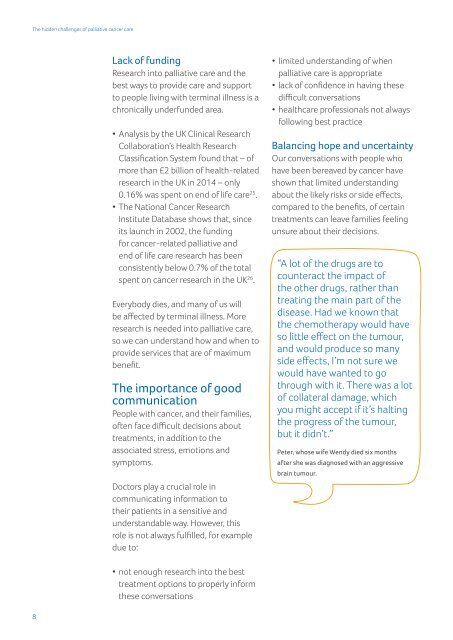The hidden challenges of palliative cancer care
hidden-challenges-palliative-cancer-care-report
hidden-challenges-palliative-cancer-care-report
Create successful ePaper yourself
Turn your PDF publications into a flip-book with our unique Google optimized e-Paper software.
<strong>The</strong> <strong>hidden</strong> <strong>challenges</strong> <strong>of</strong> <strong>palliative</strong> <strong>cancer</strong> <strong>care</strong><br />
Lack <strong>of</strong> funding<br />
Research into <strong>palliative</strong> <strong>care</strong> and the<br />
best ways to provide <strong>care</strong> and support<br />
to people living with terminal illness is a<br />
chronically underfunded area.<br />
• Analysis by the UK Clinical Research<br />
Collaboration’s Health Research<br />
Classification System found that – <strong>of</strong><br />
more than £2 billion <strong>of</strong> health-related<br />
research in the UK in 2014 – only<br />
0.16% was spent on end <strong>of</strong> life <strong>care</strong> 25 .<br />
• <strong>The</strong> National Cancer Research<br />
Institute Database shows that, since<br />
its launch in 2002, the funding<br />
for <strong>cancer</strong>-related <strong>palliative</strong> and<br />
end <strong>of</strong> life <strong>care</strong> research has been<br />
consistently below 0.7% <strong>of</strong> the total<br />
spent on <strong>cancer</strong> research in the UK 26 .<br />
Everybody dies, and many <strong>of</strong> us will<br />
be affected by terminal illness. More<br />
research is needed into <strong>palliative</strong> <strong>care</strong>,<br />
so we can understand how and when to<br />
provide services that are <strong>of</strong> maximum<br />
benefit.<br />
<strong>The</strong> importance <strong>of</strong> good<br />
communication<br />
People with <strong>cancer</strong>, and their families,<br />
<strong>of</strong>ten face difficult decisions about<br />
treatments, in addition to the<br />
associated stress, emotions and<br />
symptoms.<br />
Doctors play a crucial role in<br />
communicating information to<br />
their patients in a sensitive and<br />
understandable way. However, this<br />
role is not always fulfilled, for example<br />
due to:<br />
• limited understanding <strong>of</strong> when<br />
<strong>palliative</strong> <strong>care</strong> is appropriate<br />
• lack <strong>of</strong> confidence in having these<br />
difficult conversations<br />
• health<strong>care</strong> pr<strong>of</strong>essionals not always<br />
following best practice<br />
Balancing hope and uncertainty<br />
Our conversations with people who<br />
have been bereaved by <strong>cancer</strong> have<br />
shown that limited understanding<br />
about the likely risks or side effects,<br />
compared to the benefits, <strong>of</strong> certain<br />
treatments can leave families feeling<br />
unsure about their decisions.<br />
“A lot <strong>of</strong> the drugs are to<br />
counteract the impact <strong>of</strong><br />
the other drugs, rather than<br />
treating the main part <strong>of</strong> the<br />
disease. Had we known that<br />
the chemotherapy would have<br />
so little effect on the tumour,<br />
and would produce so many<br />
side effects, I’m not sure we<br />
would have wanted to go<br />
through with it. <strong>The</strong>re was a lot<br />
<strong>of</strong> collateral damage, which<br />
you might accept if it’s halting<br />
the progress <strong>of</strong> the tumour,<br />
but it didn’t.”<br />
Peter, whose wife Wendy died six months<br />
after she was diagnosed with an aggressive<br />
brain tumour.<br />
• not enough research into the best<br />
treatment options to properly inform<br />
these conversations<br />
8


